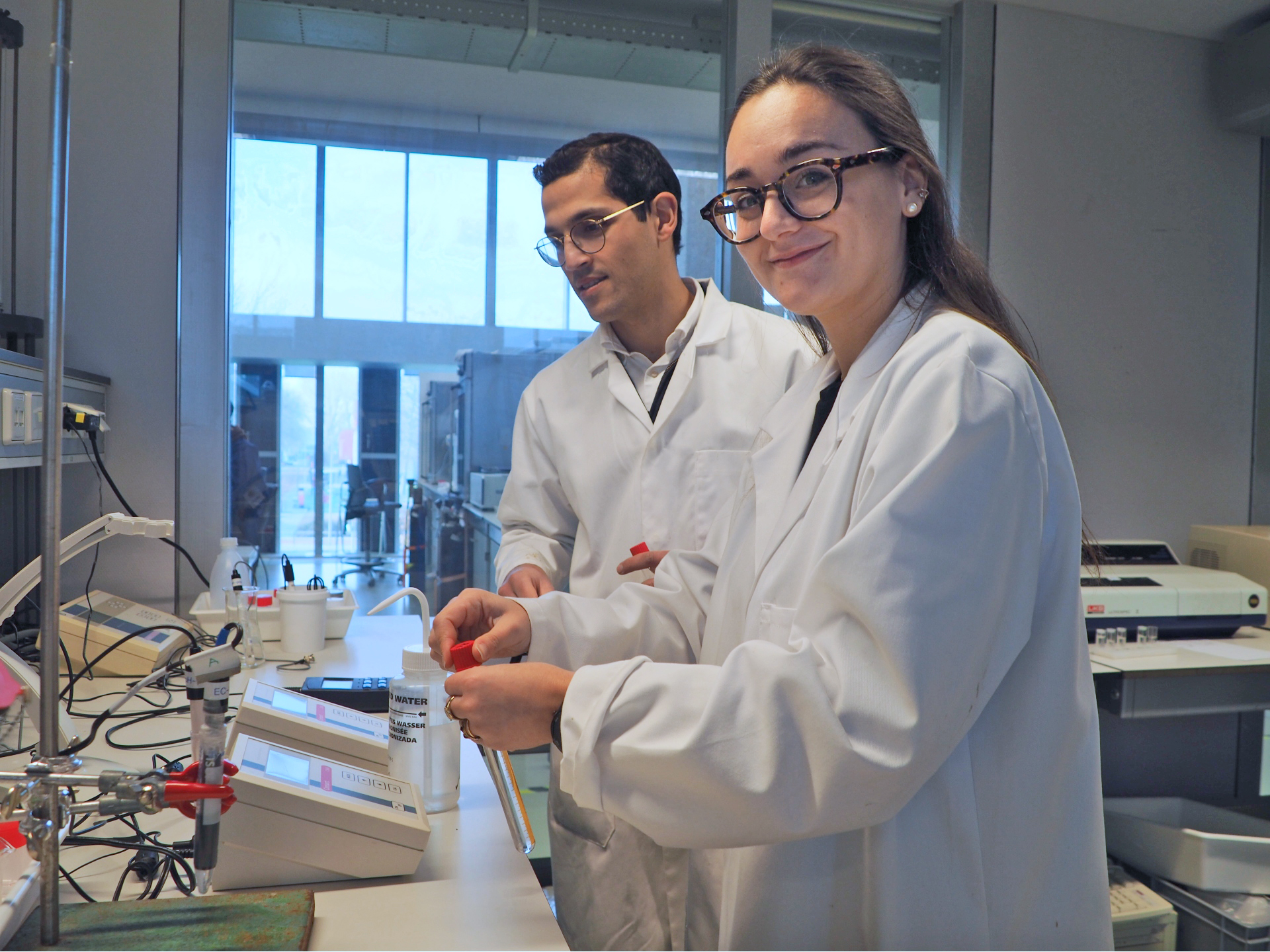Hot water from deep underground is packed with minerals. This means that lithium can be extracted from our own soil. Will it pay off? Ahmed Hussain finds out.
Ahmed Hussain and his student Erica Biagini studied water from geothermal wells. (Photo: Jos Wassink)
The appetite for lithium is keeping pace with the rise of the electric car. At the current price of over EUR 70 per kilogram of the sought-after battery metal, it is nice to hear that a geothermal source easily pumps up 10 kilograms of lithium per hour – enough for one Tesla battery pack every hour.
Dr Ahmed Hussain is a postdoctoral researcher in Mineralisation at Geothermal Projects at the Faculty of Civil Engineering and Geosciences (CEG). He took the initiative to explore the geothermal extraction of lithium and other minerals dissolved in warm groundwater at the surface.
Extracting minerals from groundwater is an environmentally friendly way of mining, says Hussain. And extraction from our own soil makes us less dependent on imports. GroenLinks MP Suzanne Kröger shares this view. She called on the State Secretary for Mining Vijlbrief in February with a motion to ‘investigate the feasibility of lithium extraction in deep geothermal energy in the Netherlands, mapping the ecological, economic and legal aspects’. Vijlbrief replied that a study on lithium concentration in the Netherlands by TU Delft was already underway, and he promised a follow-up study. “So it is not a question of if, but how,” the State Secretary said.
Research
The research that Vijlbrief mentioned was Erica Biagini’s undergraduate research supervised by Ahmed Hussain. Biagini studied the lithium content measured in 50 water samples from 13 different fields. She found high concentrations in two places: in Friesland and in Limburg. Around Delft, concentrations were lower by a factor of 10.
Phil Vardon, Scientific Geothermal Project Leader at TU Delft (also CEG), responds by saying “I am familiar with the work that Ahmed supervised. It gives a clear overview. All geothermal projects benefit from additional profits from minerals, but it seems unlikely to me that the TU Delft geothermal project is currently suitable for lithium extraction.”
Lithium extraction
Lithium rises to the surface in dissolved form. An active filtering technique increases the concentration of lithium in the solution. It is then converted into lithium hydroxide for use in batteries.
The concentrations of dissolved lithium in the Netherlands vary quite a bit and not all concentrations are known. Hussain would like to see the lithium content in the water at all domestic drilling sites recorded. This would create a map of lithium reserves in Dutch soils. This will not happen very quickly as NLOG, the Dutch Oil and Gas Portal, shows that the average number of wells drilled for geothermal exploration every year over the last five years was seven.
Vardon agrees with Hussain. “We need to monitor projects better to see where lithium and other valuable resources are. For new projects, that means acquiring good samples and analyses that can be linked to geological history. It may well be that deeper wells contain higher lithium concentrations. That could be a point of consideration when developing a new project.” In other words, drilling deeper for more lithium could be beneficial.
Preparations for geothermal lithium extraction are already taking place in Germany. The electrolysis company Nobian and Australian mining group Vulcan are going to investigate the feasibility of producing lithium hydroxide from a geothermal source near Frankfurt for electric car batteries.
The research is taking place at two different plants. The first is next to a geothermal project and uses Direct Lithium Extraction (DLE) to increase the concentration of lithium in the water. The other plant is connected to several geothermal wells and uses electricity to convert the lithium into lithium hydroxide.
The Netherlands
What are the prospects for the Netherlands? Hussain hopes for a location where there is geothermal supply and demand in combination with a high lithium concentration. Proceeds from lithium extraction could then increase revenues for geothermal projects. “These will then no longer need subsidies,” Hussain explains. He plans to continue working with undergraduates on the ecological, economic and legal aspects of geothermal mining.
Vardon is cautiously optimistic about geothermal mining albeit not yet. “In the short term, I do not see this happening in the Netherlands. We need more data and more exchange of data. This is especially so for exploring locations where there are no geothermal or other underground projects as yet, for example deeper than existing projects or in areas that have not been well explored.”
Read more
- Maria Erica Biagini, Geothermal mining – the potential for environmentally friendly extraction of valuable components from geothermal brines in the Netherlands. Download BSc thesis in PDF.
Do you have a question or comment about this article?
j.w.wassink@tudelft.nl


Comments are closed.